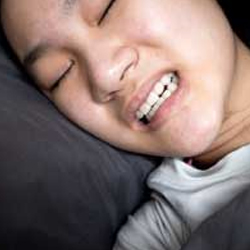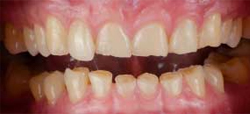How To Deal With Bruxism (Tooth Grinding)
Bruxism is the clinical name for tooth grinding or clenching. Bruxing often happens while you sleep but can also occur during the daytime. Many people experience sore chewing muscles, headaches, sensitive teeth or pain in the jaw joint hinges (TMJs) as a result of grinding. However, many people don’t have symptoms, and have no idea know it’s going on as the years pass by. If your teeth are wearing down, cracking or breaking…problems are occurring, and you need help! Most people think grinding is primarily a result of stress emotions such as anxiety, anger or frustration. It is true that these can contribute, but there is more to the story. The body likes harmony, and we tend to grind when we don’t have it. For example:
Some Causes of Bruxism
Occlusal (bite) Interferences: At night, the chewing muscles tend to pull the TMJ’s into their comfortable, home base position and the lower jaw hinges closed, hoping for a harmonious closure. If there are bumps in the road, you’ll grind them out….and then some. These interferences can also pose a problem when chewing, and lead to accentuated wear patterns on the teeth.

Obstructive Sleep Apnea (OSA): When nighttime airway restrictions cause stress to the body, many people subconsciously grind their teeth in an effort to move the lower jaw and open up the airway.
Drug Reactions: Many medications present bruxism as a side effect. The most common are anti-depressants, but may include everyday drugs such as caffeine, tobacco and alcohol.
Acid Reflux: Stomach acid that comes up through the throat and airway causes irritation that can stimulate bruxism—especially at night. And to add fuel to the fire, the increased acid in the mouth causes the grinding to wear down teeth at an accelerated rate because it softens the enamel.
Neurologic Origin: A small percentage of people grind during delta stage sleep, and many of this subgroup tend to show other nervous system conditions, such as obsessive-compulsive disorder, Parkinson’s Disease, epilepsy, and others.

Age: Many, or dare we say most, children grind teeth at some point or another, especially during the irritation of losing old and gaining new teeth.
Stress: Increased stress, anxiety, anger or frustration can lead to bruxism. Additionally, having a personality type that is aggressive, competitive, or hyperactive can increase your risk.
Bruxism is a dental disease that can have a significant impact on the longevity and health of your teeth. If you suspect it could be occurring, talk to your dentist about identifying the cause(s). They may be able to uncover subtle risk factors such as OSA, acid reflux, prescription side effects, or bite interferences. For treatment, your dentist may suggest a medical specialist consultation, a bite equilibration to remove interferences, or a precision appliance for night-time wear to reduce (not just protect) your stimulus to grind.
